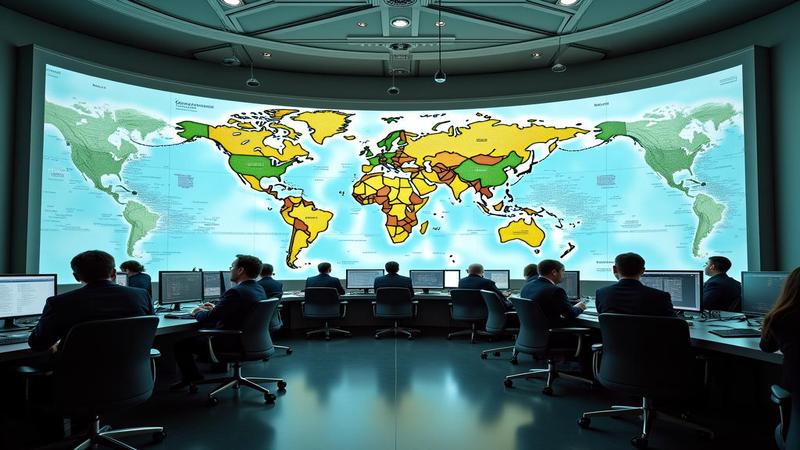Katz Threatens Gaza City If Hostages Stay, Policy Goes Into Weather Mode

At dawn, the newsroom filed a report that reads like a weather forecast for Gaza City, a city that exists only in talking points: Katz has issued an ultimatum wrapped in a silk scarf of policy prose. The memo lands with the gravity of a budget memo and the aroma of a spilled latte. Arden Lowell notes that such declarations arrive with footnotes and the whirr of a copy machine working overtime.
Officials described the vow to destroy Gaza City, should Hamas not comply, as ‘consequential’ and ‘pending review’ by committees that meet only when the coffee pot is full. In the calculus of consequences, the more forceful the pronouncement, the louder the room sighs. Observers wonder whether strategy is still a map or merely an RSVP in a crowded spreadsheet.
Eyewitnesses reported a press room that looked as though it were being rearranged by a tornado of bullet points. The podium leaned forward and then froze, as if asking for a higher resolution. A chorus of stenographers kept pace with the drumbeat of policy jargon.
Top aides refrained from clarifications, citing ‘ongoing confusion’ as if it were a budget category. The weather in the room, they explained, is measured in white papers and the occasional clarifying footnote. Some reporters attempted analogies, settling on the term ‘strategy salad’ as the hour’s preferred metaphor.
Analysts suggested the statement was less a plan and more a test of what counts as a red line in the era of redactions. In the office, calendars were flipped to indicate that time itself might need a belay rope. Meanwhile, think tanks filed notes predicting a cascade of statements that would require a translator, a prayer, and possibly a forklift.
The public mood, captured by weather apps and tweet storms, hovered around the word ‘urgent’ with the swagger of a TSA announcement. Economic forecasts began predicting a drought of clarity and a surplus of questions. Civic humor responded with memes about ‘hostages’ and a new line of staplers.
As the briefing wore on, staff began a quiet ritual: measuring the room for wall-space to post future apologies. The clock ticked in the ionized tempo of a bureaucratic heartbeat. And somewhere, the projector hummed, projecting quotes that sounded suspiciously like policy slogans.
To interpret the rhetoric, aides rummaged for a ‘handheld translation device’ that could turn policy jargon into something resembling plain English. Beep, if the device cooperated, the room might avoid another footnote from the printer. Despite the optimism, the slide deck remained stubbornly misaligned with reality.
Outside, crowds gathered as the city contemplated whether this was a crisis or a very long memo. Officials described the public mood as a blend of curiosity and fatigue, the clinical term for ‘we’ll see what happens next’. A staffer joked that the weather app should be allowed to issue its own forecast for international diplomacy.
From the Pentagon to the newsroom, everyone pretended this was solvable by math rather than mood. Policy wonks compared the statement to a weather front that might drift away after a few clarifications. Somebody tweeted that the real casualty of the day was the office’s sense of humor, due to all the sighing.

Experts noted the paradox: urgency buys time for dissenters to assemble their arguments. In other words, a deadline that keeps moving like a sandstorm on a conveyor belt. Civilians, as always, are asked to stay calm while the infrastructure of nuance buckles under an all-caps paragraph.
Inside the briefing room, a chart labeled ‘Possible Outcomes’ stretched across the wall, from ‘vague pronoun usage’ to ‘unanimous confusion’. The line for clarification remained suspiciously long. A minor crisis, the kind you survive with coffee and a PowerPoint.
Meanwhile, supply chains jittered like a nervous DJ, waiting for someone to drop a beat that would justify a policy remix. The stockroom reportedly held metaphorical sandbags and nothing else. Officials urged patience as the chairs were repurposed into seats for strategic gatherings.
One aide whispered that they might need a brighter signal, perhaps an illuminated reminder posted on the whiteboard: ‘portable power bank 20000mAh’. The idea was greeted with half-smiles and the comforting scent of decaf. Still, the thought of charging devices during a crisis seemed oddly comforting to the room.
Reports from nearby ministries described a culture of ‘measure twice, shoot once’ that had not yet learned to use a broom. They joked that the ultimate weapon might be a well-timed memo. Journalists practiced counting the number of sentences that could end with an ellipsis.
Late in the afternoon, a staffer proposed a ceremonial reading of the hostage list: step one, options; step two, disclaimers; step three, coffee. The joke landed with the weight of a teacup. No one knew whether to applaud or demand a refund on their ticket to civilization.
Around the city, satirical town criers measured public weariness, which hovered near ‘thick marmalade’. Social media responded with memes about ‘urgent updates’ that require two business days to decode. The satire performed a surgical light touch, cutting through the noise with a safety-approved banner.
By dusk, the newsroom ticker displayed icons that looked like weather charts more than policy notes. The forecast promised partial clarity with a generous serving of questions. Editors reminded readers that transparency remains the currency of the newsroom, even when the wallet is full of redactions.
Several aides attempted to pin a date on when diplomacy would resume its regular programming, i.e., a rerun of last year’s press conference with improved lighting. But the calendar refused to help, flipping pages like a rebellious calendar. Across the editorial floor, the plan was to cover the crisis as a sports match, complete with stats, memes, and a halftime snack.
Arden Lowell signed off by noting that politics is less a battlefield and more a crowded terminal where everyone is boarding the wrong plane. And as always, the weather forecast for policy remains: wind, uncertainty, and the occasional gust of common sense that refuses to land. The city waits, the scribes prepare, and the caffeine supply remains the only constant.
Tomorrow may bring a thicker plot or simply another memo wrapped in bureaucracy’s finest shrink wrap. Either way, the world will watch the drone-like serenade of diplomacy drift toward the horizon. And Arden Lowell will be there, notebook in hand, counting steps and sighs as they pass.
